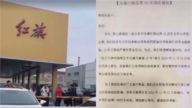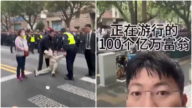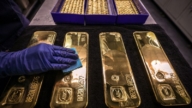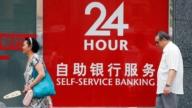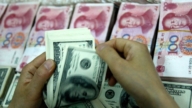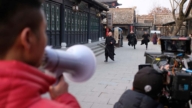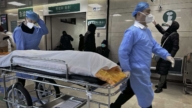【新唐人2012年8月29日訊】中國經濟增長已經連續六個季度下滑,已有更多的專家「看衰」中國經濟前景;更有觀點認為,中共當局只能以再次「吹泡泡」的方式,或者「口頭宣傳」,來帶動目前的中國經濟蕭條。那麼中國的經濟究竟有沒有出路﹖十八大前中共當局該如何因應,我們來看看專家的解讀。
「中國高增長神話即將破滅?」、「中國的經濟即將崩潰?」這些標題,是1個多月之前媒體的報導,似乎不是危言聳聽。因為,目前如「出口疲弱 經濟坐悶鍋」、「前景看衰 中國再『吹泡泡』救市」,更多的專家,以不同的論點看衰中國經濟。
早有專家認為,中國不是「市場經濟」,而在中共「十八大」更替的時候,當局能否再次營造一番榮景,在繁榮穩定的背景下換屆﹖恐怕不被專家看好。
美國「南卡羅萊納大學艾肯商學院」教授謝田分析,中共當局為保榮景仍在持續推行刺激經濟政策,將保增長作為優先,放棄了控制通貨膨脹的目標。
美「南卡羅萊納大學艾肯商學院」教授 謝田:「但是,我們從最近的1-2個月的情況看,中國經濟的局勢繼續惡化,繼續在實施硬著路。所以實際上,中央政府它即使想刺激經濟、挽回經濟,或者保持所謂的經濟繁榮的假象,但恐怕它是力不從心了。」
據報導,大陸財經作家吳曉波認為,「胡溫」十年任期第三度由政府啟動的大規模投資,總體來看,所採取的辦法依然是靠製造泡沫。
謝田認為,十八大前,中共必然還會做出一些努力。不過,中共中央對通貨膨脹還是有點顧忌,目前不敢馬上再印更多的鈔票。
謝田:「但是地方政府它為了保持它自己的運行,它很可能在經濟走向跟中央政府也不一致,投資、借款來刺激當地的經濟,所以我們看到中國中央政府和地方政府之間,也有點大難來時各自飛那種感覺,各顧各的在自行其事。」
另外,旅美中國經濟社會學者程曉農認為,實際上中國經濟早就陷入困境;對中國經濟抱持樂觀者,都是一廂情願。
旅美中國經濟社會學者 程曉農:「故意看低,就是英文Underestimate,低估中共問題的嚴重性,誇大中共經濟光彩的一面,配合中共作宣傳。實際上,中共經濟的問題遠遠比它自己公開承認的嚴重得多,而且這些問題都是沒有辦法解決的。」
程曉農指出,中國經濟陷入困境,主要來自內地佔人口百分之7、80的勞動力和百姓沒有足夠的消費能力,中國經濟無法自我支撐,以致完全依賴出口。
程曉農:「其實這裡面潛伏的問題更大,收到的外匯,需要同樣對應的在大陸內部投放人民幣,這二十多億都是貨幣超量投放,所以必然的要帶點通貨膨脹,結果是自動的拉高工資成本,很快使大陸產品沒有辦法在國際市場維持競爭力。」
由於,通貨膨脹造成工資成本高漲,外商無利可圖陸續撤資,而向內陸轉移的外商,未來需面對同樣的問題。
程曉農:「所以,大陸現在其實已經有點病入膏肓的味道。中共政府根本就不聽,原因是 No choice它沒有辦法。那麼,他走到今天這一步,就像走上懸崖一樣,一步一步往上走到最後發現到頭了,退也退不回去了。所以,中共其實從今年上半年以來,一直在設法增加貨幣供應,想要刺激經濟,但是沒有用。」
程曉農分析,目前中共當局可以解決中國經濟困境的唯一方式,就是繼續增加貨幣供應,但這同時將繼續製造通貨膨脹,最終的結果仍然是「殊途同歸」。
採訪編輯/梁欣 後製/蕭宇
Experts: China’s Economy In A Serious Trouble
It is the 6th quarter since China’s economy is on a downslide.
More and more experts are pessimistic about its future.
Some believe the CCP can only use the method of “bubbles”
or propaganda to speed up the grim economy.
Is there a way out for China’s economy? What would CCP
(Chines Communist Party) do before its 18th congress?
“The myth of China’s rapidly increasing economy will come
to an end,” “Chinese economy will face collapse,” etc.
These headlines were reported more than a month ago.
But now, many experts look at it with different eyes.
Some experts believe
China does not have market economy.
Before the 18th congress, experts do not look favorably
to Chinese regime’ chance to create economic stability.
Professor Xietian from South Carolina Aiken School
of Business analyzes the issue.
He thinks, in order to maintain an image of economic glory,
the CCP continues to promote economy’ stimulating policies, and has given up the goal of controlling inflation.
Professor Xietian: “The past 1-2 months show that China’s
economy is worsening, taking on a strategy of dragging out.
Thus, even if CCP wants to stimulate economic growth
or maintain the so-called false image of economic glory, they are not able to do so.”
Reports talk about the view of Mainland economic writer,
Wu Xiaobo.
Wu believes, looking at it from a broader perspective,
since the 3rd largest investment of the Hu and Wen’s rule, the method used is still just creating bubbles.
Xietian thinks, CCP will still put in some more efforts
in this direction before the 18th congress.
However, the CCP still has some worries concerning
inflation and is afraid to print more money right away.
Xietian: “In order to maintain its own operations, local
governments may not take the same route as the central government on the matter of economy.
They may not invest or loan to stimulate local economy,
so we see how central and local governments differ.
There is a sense that everyone does their own thing,
and takes their own paths when big tribulations come.”
Economist Cheng Xiaonong believes China’s economy
has been in trouble for quite a while,
Those who are optimistic about China’s economy
are just having a wishful thinking.
Cheng Xiaonong: “They are underestimating the seriousness
of CCP’s problems and overly glorifying its economy, cooperating with the CCP propaganda.
In reality, CCP’s economic problems are much more serious
than it admits, and these problems are not solvable.”
Chen Xiaonong points out, a key reason for China’s economy
to be in trouble is its low consumer power.
Inland people take up 70-80% of the labor force,
and Chinese people do not have enough consumer power.
Chinese economy cannot support itself,
thus it solely relies on exports.
Cheng Xiaonong: “In reality,
there are deeper problems here.
The foreign cash it receives have to be turned
into the equivalent of RMB in Mainland China.
This leads to more than two billion over-supply,
so inflation is necessary.
The result would be wages going up, and Mainland products
being unable to maintain its global market competitiveness.”
Due to the inflation causing salaries to go up, foreign
companies cannot make profits and continue to withdraw.
Yet, foreign companies that still go to Mainland China,
will face the same problem in the future.
Cheng Xaionong: “So there’s a sense of things being
beyond repair, so CCP doesn’t listen, as it has no choice.
Hence, it has gotten to this point, like climbing a cliff, step
by step up, until it realizes this is the end, with no way back.
In reality, since the first six months of this year, it has been
trying to increase money supply, wanting to stimulate the economy, but there is no way out.”
Cheng Xiaonong analyzes, currently the only way for Chinese
regime’s economic woes is to increase the money supply.
However, this will create inflation, thus it’s just
like taking different routes to the same destination.


